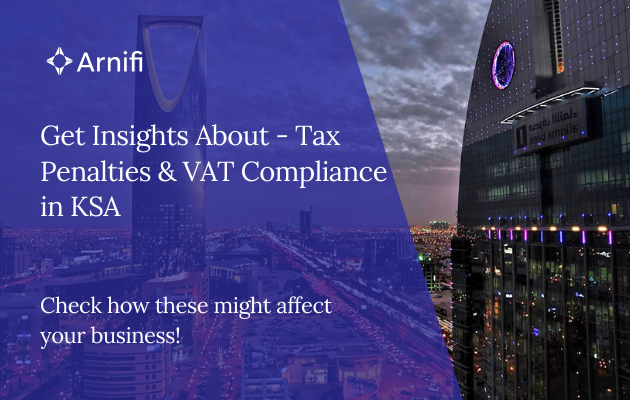VAT Compliance and Penalties in KSA
by Shethana May 23, 2025  5 MIN READ
5 MIN READ

VAT stands for Value Added Tax. It is a tax imposed on the supply of goods or services. The tax is levied on the value addition at each stage in the supply chain, from the production and distribution to the final sale of the product or service to the consumer.
Table of contents
VAT RATES
Standard Rate:15% on supply of goods and services
Zero Rated goods and services:
Zero-rated goods are charged at 0% and can claim input tax credits on VAT purchases
- The supply of certain medications and medical equipment specified by the Ministry of Health and Saudi Food and Drug Authority;
- The supply of gold, silver, and platinum that is for investment purposes that is at least 99% pure and tradable in the international market;
- Any exports destined outside the GCC region;
- Services supplied to non-GCC residents; and
- International transport services of goods and people, the supply of qualified international transport vehicles, and related services such as spare parts, maintenance, repair, etc.
Exempted Goods and Services:
Exempt goods and services are not subject to VAT. A seller of exempt supplies does not collect VAT on sales and is not allowed to recover the input VAT paid on his purchases/expenses.
- Interest or lending fees charged with an implicit margin, such as loans and credit cards, mortgages, and financial leasing
- Transactions involving money and securities
- Operation of current, deposit, and savings accounts
- Provision or transfer of a life insurance contract or the reinsurance of a life insurance contract.
TYPES OF VAT REGISTRATION
- Voluntary Registration: For businesses whose turnover exceeds SAR 187,500 but does not exceed SAR 375,000, obtaining a VAT registration is entirely optional.
- Mandatory Registration: Businesses whose turnover exceeds SAR 375,000 must register for VAT.
BENEFITS OF VAT REGISTRATION
- Can Claim Input Tax Credit
- Issue Tax Invoices
- Eligible for a refund of VAT paid on purchases used to make the zero-rated supplies
- Lends Credibility to the business
- Avoid Penalties for Not Registering
STEP-BY-STEP PROCESS FOR VAT REGISTRATION
- Register for TIN, if you have not obtained it already
- Login to the GAZT Portal
- Select ‘VAT Registration” on login to the GAZT Portal
- Fill out the VAT Registration form and upload all the relevant documents as applicable
- After successful review and approval, VAT registration will be issued
FREQUENCY OF VAT FILING
The frequency of Tax Filing Can be Monthly or Quarterly depending on the annual turnover.
Monthly Returns: Businesses with annual taxable sales above 40 million SAR
Quarterly Returns: Businesses with annual taxable sales under 40 million SAR
WHEN TO FILE FOR VAT?
The VAT return for each tax period must be filed between the 1st and the last day of the month following the end of the tax period (Quarterly and Monthly).
STEP-BY-STEP PROCESS FOR VAT FILING
- Log into the ZATCA website
- Go to “Indirect Tax – Value Added Tax” tab
- Go to “Returns”
- Select the return to be filed
- Submit VAT return form
- Sales subject to the standard rate
- Purchases subject to the standard rate
- Submit the request, and you will receive a notification confirming the receipt of the return and the invoice amount via SMS and email.
PENALTIES
| The person who has not applied for registration within the specified period | SAR 10,000 |
| The person who fails to pay the tax due during a specified period | 5% of the value of the unpaid tax for each month or part thereof for which the tax has not been paid |
| A non-registered person issuing a tax invoice | SAR 100,000 or less |
| A person who has not kept tax invoices, books, records, and accounting documents for the specified period | SAR 50,000 or less per tax period |
| Violation of any other provision of the VAT regulations or the VAT law | SAR 50,000 or less |
CONCLUSION
Value Added Tax in KSA is significant in the process of diversifying the country’s revenue base and decreasing reliance on oil revenues. VAT in KSA is governed by ZATCA (Zakat, Tax and Customs Authority) and charged at a general rate of 15% on most goods and services, with some supplies being zero-rated or exempt depending on their nature and societal significance.
Traders with over SAR 375,000 taxable turnover are compulsorily required to register, whereas those with turnover of more than SAR 187,500 can voluntarily register, gaining advantages such as recovery of input tax and eligibility for refund. Proper filing and timely registration — monthly or quarterly based on turnover — must be ensured to ensure compliance and not incurring hefty penalties.
Additionally, certain industries such as health, finance, and foreign trade are accorded special treatment under VAT to strike a balance between fiscal objectives and economic growth and social wellbeing.
Generally, VAT in KSA is an organized, regulated mechanism that ensures transparency and accountability in commercial transactions as well as supports the economic viability of the nation. Compliance not only guarantees legal compliance but also enhances business reputation and operational effectiveness in the Saudi market.
Top UAE Packages

Related Articles
Top UAE Packages



